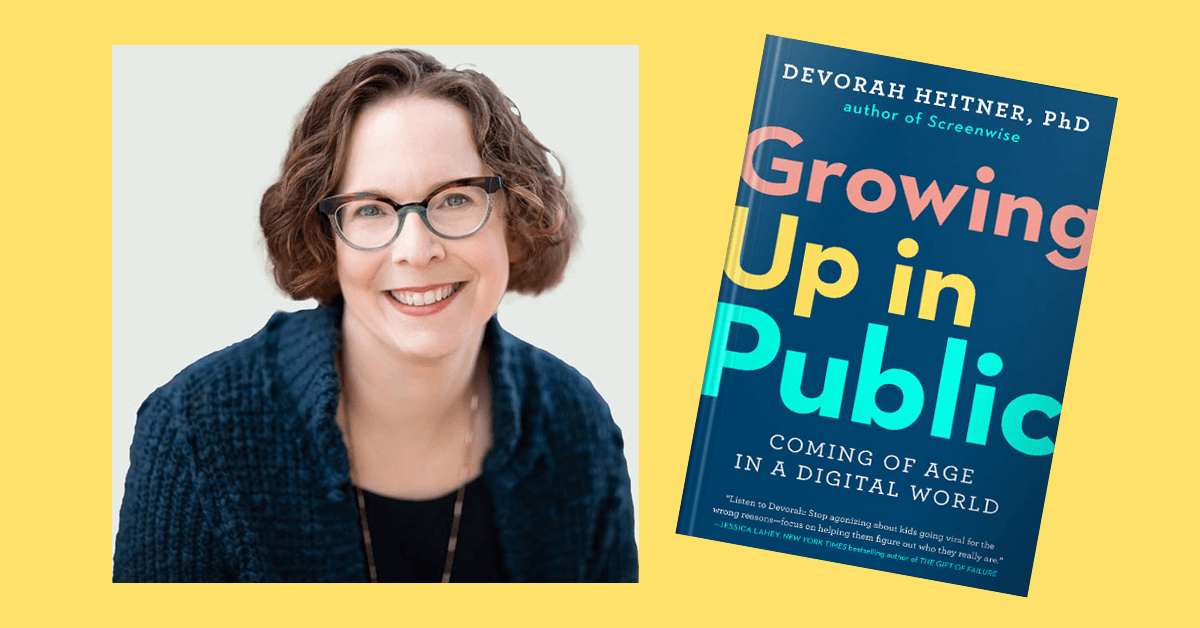September 28, 2023
The U.S. surgeon general’s warning last May about the heightened dangers social media poses to young people’s mental health has understandably reignited many parents’ fears about their children’s engagement with online apps.
Want some help in dousing the flames?
Dr. Devorah Heitner’s Growing Up in Public: Coming of Age in a Digital World offers effective strategies for helping kids manage social media. The author of Screenwise, Heitner has already done a lot of thinking about how screen time shapes and reflects students’ characters. In her new book, she argues that when it comes to online activity, mentoring kids is much more effective than monitoring them. Her point of view makes a lot of sense, given how easy it is for kids to bypass parental restrictions by jumping on a VPN or by creating “spam” accounts that are private and unknown to parents.
Knowing this, how can we shift from focusing on consequences to fostering character?

I interviewed Heitner to ask her that question and to learn more about the strategies outlined in her book. She told me that she was inspired to write “Growing Up in Public” because she feels that too many discussions with young people involving social media warn them about not getting caught for poor behavior rather than encouraging them to do the right thing in the first place: “Rather than worry about whether Harvard won’t admit you because of a joke regarding genocide, consider that those jokes aren’t funny in the first place.” She wants parents and educators to prompt kids to ask themselves, “Is this how I want to represent myself?”
Avoiding Surveillance
That said, parents have good reason to worry about their children’s digital footprint. Kids usually launch their social media profiles as middle schoolers, a developmental stage in which executive functioning skills like impulse control and sound judgment are still evolving. Parents fear that the permanence of kids’ posts may hinder them from getting internships, college acceptances, and even jobs in the future. To address that worry, many parents turn to surveillance apps to monitor their kids’ online activity.
Heitner calls this the “Big Brother approach:” Parents view website histories, scan texts, and install geo-tracking apps that pinpoint the location of their kids at all times. When schools provide online grading apps, parents monitor scores on tests and quizzes in real-time, sometimes receiving notifications about a poor grade before their children get their assessments back to see what they’ve done wrong.
Heitner contends that “parents can’t prevent problems this way, only catch their kids doing the wrong thing.” While many parents monitor their children’s online activities with an eye towards safety, such monitoring often hinders their children from learning self-advocacy and independence. Such surveillance techniques can also erode parents’ relationships with their children, who may “feel like they are being watched but not seen.” An unintended consequence may be that kids become more secretive about their actions.
Sometimes parents surveil their children’s online activities simply because they are curious about their social lives. This often happens during the middle school years, as kids start to prioritize friends over their families. Parents read their children’s posts and texts because they are “hungry” for information or insight. Heitner warns that while this “snooping” may satisfy a parent’s curiosity, it doesn’t achieve the goal of actually connecting with one’s child.
Having Meaningful Conversations With Your Child
Rather than take the surveillance approach, Heitner suggests parents initiate difficult conversations about their family’s values and how online behavior should embody those values.
I asked her what that looked like. She responded that parents should talk to their children about what apps they use and with whom they communicate. In addition, parents should have a discussion about boundaries in terms of what is appropriate to share and post. Her mantra is “When in doubt, don’t share it out.”
She believes in being proactive by “posing scenarios before the inevitable comes.” Scenarios could include talking with your child about what to do upon receiving a request for nude photos or about how to be an upstander on a group text that contains gossip. It could also mean discussing how to respond to FOMO (fear of missing out) in mature ways.
Modeling Online Behavior
Heitner also believes that it’s essential for parents to guide their children’s online behavior by modeling the conduct they would like to see. This means that parents should be mindful of their own posts. Heitner commented that “of course parents want to share what their kids are doing, but they have to see that their kids are not an extension of themselves.” When it comes to sharing kids’ pictures or accomplishments, she suggests that parents ask permission by 3rd or 4th grade. “Most kids don’t want a picture of themselves in their PJs online, especially one that their classmates’ parents will see.” Similarly, parents may be proud of a first place finish at the Geography Bee or a recent college acceptance, but posting about them online could be embarrassing to their adolescent.

Heitner also tackles students having different social media accounts. Many have Instagram or Snapchat accounts that are shared with a wide network but reserve “spam” accounts for their close friends. Heitner told me that parents should see having “different accounts for different groups as savvy rather than devious.” She contends that “it’s normal for kids to want more privacy.” At the same time, parents should remind their children that a fight with a good friend could mean that private posts go public. Tweens and teens need to understand that there is still a risk, even when sharing content with just one person.
One risk I talked with her about was sexting (young people now usually just say “sending pics”). “We live in a world where sending explicit pictures and texts is not a safe way for tweens and teens to explore sexuality and romance,” Heitner writes in her book. “We live in a world that makes this approach emotionally and reputationally dangerous.” To be supportive in conversations with young people about this issue, Heitner advises parents to focus on “consent and safety, rather than disgust, shame, or stigmatization.”
Handling Mistakes
How should parents deal with the mistakes their kids make online, perhaps posting an offensive comment or video?
Heitner advises parents to help their kids “focus on deeper reflection, rather than a quick reputation Band-Aid.” They need to acknowledge what they’ve done wrong. After accountability comes contrition and consequences. As parents, “we can make it clear to them that they have our support in moving forward even if they have done something disappointing.” This is a chance to work on character and values—“for the sake of making a positive impact in the world, not for the sake of ‘selling’ themselves to colleges and future employers.”
I asked Heitner about the surgeon general’s warning regarding the negative impact social media has on the young, especially girls.
Photo-based apps feature idealized bodies, many of which have been edited. “Body image is a big issue,” she said. “Kids have different vulnerabilities, and social media can exacerbate problems.”
In her book, Heitner delves into this topic, writing that the “intense focus on physical appearance on social media often leads teens and tweens to constantly compare themselves against traditional beauty standards—and when they fail to meet them (as most people do), they often feel dissatisfied with the way they look.” She cites a study finding that “a third of girls and women won’t post unaltered images of themselves.” Boys feel pressure, too. They can never appear to be trying too hard to look good.
Heitner advises parents to decrease the focus on body image by posting pictures of their children’s faces rather than their bodies. “During adolescence, kids are developing and changing shape. Don’t post a lot of full-body pictures in leotards or dance outfits. It’s a tough time for kids to have a ton of documentation.”
What’s true of the compulsions driving a focus on body image is symptomatic of the larger ways in which social media feeds compulsive behavior; Heitner rightly advises that parents teach their children “to pay attention to their emotional temperatures when looking through social media…The more vulnerable we’re feeling, the less time we should spend on apps that push us toward social comparison.”
There’s light at the end of this tunnel, and it’s not being emitted by a screen. As we grow increasingly aware of how toxic social media can be, we’re also addressing problems involving young people that we’ve ignored for way too long.
“I’m excited about the ways that kids are destigmatizing mental illness and neurodiversity,” Heitner said toward the close of our interview. “Parents worry about the stigma and vulnerability of having students discuss their personal experiences, but we should celebrate how kids are changing the culture around mental illness and learning differences.”
Maybe, just maybe, by leaving our phones behind we will come back more fully to each other, with a better understanding of and appreciation for how valuable our personal relationships—lived in real time rather than through a screen—can be.
You may also be interested in reading more articles written by Elaine Griffin for Intrepid Ed News.


